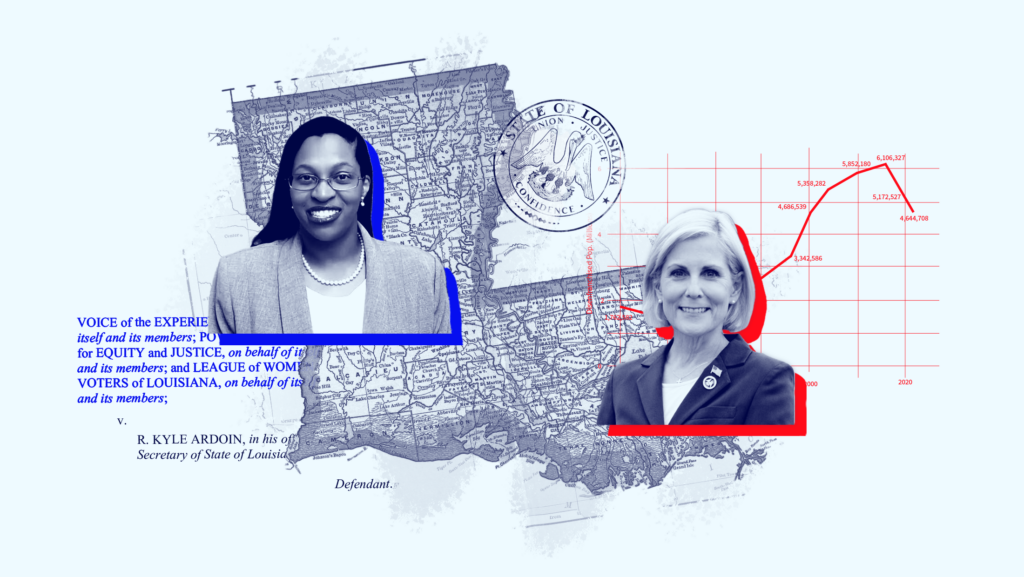What’s at Stake in the Louisiana Secretary of State Race?

On Saturday, voters in Louisiana will cast ballots in the secretary of state race to determine who will become the chief election officer ahead of 2024. Since the current secretary of state, Kyle Ardoin, is retiring, Gwen Collins-Greenup (D) and Nancy Landry (R) will be on the ballot in tomorrow’s election. In his announcement, Ardoin railed against “the pervasive lies that have eroded trust in [Louisiana] elections by using conspiracies so far-fetched that they belong in a work of fiction.”
Louisiana elections use the majority-vote system. All candidates, regardless of party affiliation, compete in the same primary. At this stage, a candidate can win the election outright by receiving more than 50% of the vote. However, if no candidate secures the majority of the vote, the top two vote-getters from the primary advance to the general election, regardless of party.
Collins-Greenup and Landry received 19.2% and 19.4%, respectively, in the eight-candidate primary. Collins-Greenup was the only Democrat in the primary. In 2019, Collins-Greenup unsuccessfully ran against Ardoin, receiving 41% of the vote in the general election.
As the state’s chief election officer, the secretary of state is responsible for preparing and certifying the ballots for all elections, promulgating all election returns and administering Louisiana’s election laws, except those relating to voter registration and custody of voting machines.
The two candidates are fairly similar on the issues facing Louisiana’s elections, but their experiences differ. Collins-Greenup is an attorney in Baton Rouge, while Landry is currently Ardoin’s second-in-command. Landry has argued she is the only one in the race with the experience necessary to run a statewide election. Both candidates agree that the state’s outdated voting machines need to be replaced ahead of the presidential election and both are concerned about consistent low voter turnout, but are hoping to shake voters of their “political fatigue.”
Ardoin is the defendant in two lawsuits currently challenging Louisiana’s congressional and legislative maps for diluting Black voting power.
In 2022, Louisianans voted under an illegal congressional map, prompting voters and civil rights groups to file a lawsuit against the current secretary of state. In June of last year, a federal judge blocked the state’s congressional map, agreeing with the plaintiffs that the map likely violates Section 2 of the Voting Rights Act (VRA) by diluting the voting strength of Black voters, who make up 33% of Louisiana’s voting-age population.
The state then filed an emergency appeal to the U.S. Supreme Court, which reinstated the previously blocked map for the 2022 cycle in time for the November elections.
After the maps were allowed to remain in place for last year’s elections, the Court paused the case pending a decision in Allen v. Milligan, a similar case regarding Alabama’s congressional map. After Allen was decided, the Supreme Court unpaused the case and sent it back to the U.S. 5th Circuit Court of Appeals for further litigation.
Just last week, the 5th Circuit vacated (meaning, voided) the 2022 decision that blocked Louisiana’s congressional map but created a timeline for a new, fair map to be implemented before the 2024 elections. The court set a Jan. 15, 2024 deadline for the Louisiana Legislature to enact a new congressional map or determine that they will not adopt a new plan, in which case a trial will be held on the current map in the district court on Feb. 5, 2024. Similarly, if the plaintiffs object to a new plan approved by the Legislature, the district court will determine if that map is VRA-compliant.
Meanwhile, the state’s legislative maps are being challenged in a lawsuit that alleges that the new legislative districts also violate Section 2 of the VRA, the result of “packing” Black voters into certain districts and “cracking” them among other districts with the sole purpose of diluting the power of their vote.
The lawsuit is seeking to block the use of the enacted maps in future elections in addition to the ordering of new VRA-compliant maps that appropriately reflect the state’s Black population. The federal court paused proceedings pending a decision in Allen v. Milligan in late August of last year. A trial is scheduled to begin on Nov. 27 and last through Dec. 8.
There’s one active voting rights case in Louisiana and the defendant is the current secretary of state.
This May, various voting rights groups, including the League of Women Voters, filed a lawsuit against Ardoin challenging the state’s re-enfranchisement policy for “suspended” voters: citizens who were previously registered to vote and whose registration was suspended due to a felony conviction.
According to the Sentencing Project, more than 50,000 Louisianans are disenfranchised due to felony convictions. This rate is compounded by the state’s bifurcated re-enfranchisement practice that the plaintiffs argue violates the National Voter Registration Act and complicates regaining the right to vote.
In Louisiana, if a person with a felony conviction was previously registered to vote, they must provide extra documentation when registering to vote. However, if the person was not previously registered, they can register to vote like any other voter by registering online, in-person or by mail. Litigation is ongoing.
By Peter Robins-Brown
In tomorrow’s election, the stakes for Louisianans are high. Just earlier this month, Louisiana Republicans notified a federal court that they are challenging the constitutionality of Section 2 of the VRA — which prohibits racially discriminatory voting laws and maps — in the lawsuit against the state’s legislative districts. It’s a critical tool in the fight for fair representation.
In October, Louisianans approved a constitutional amendment that prohibits the usage of private grants to fund election administration. This ban will make the secretary of state’s job harder in the face of much-needed voting machine updates, demonstrating the need for a secretary who is committed to improving elections for every eligible voter in the state.